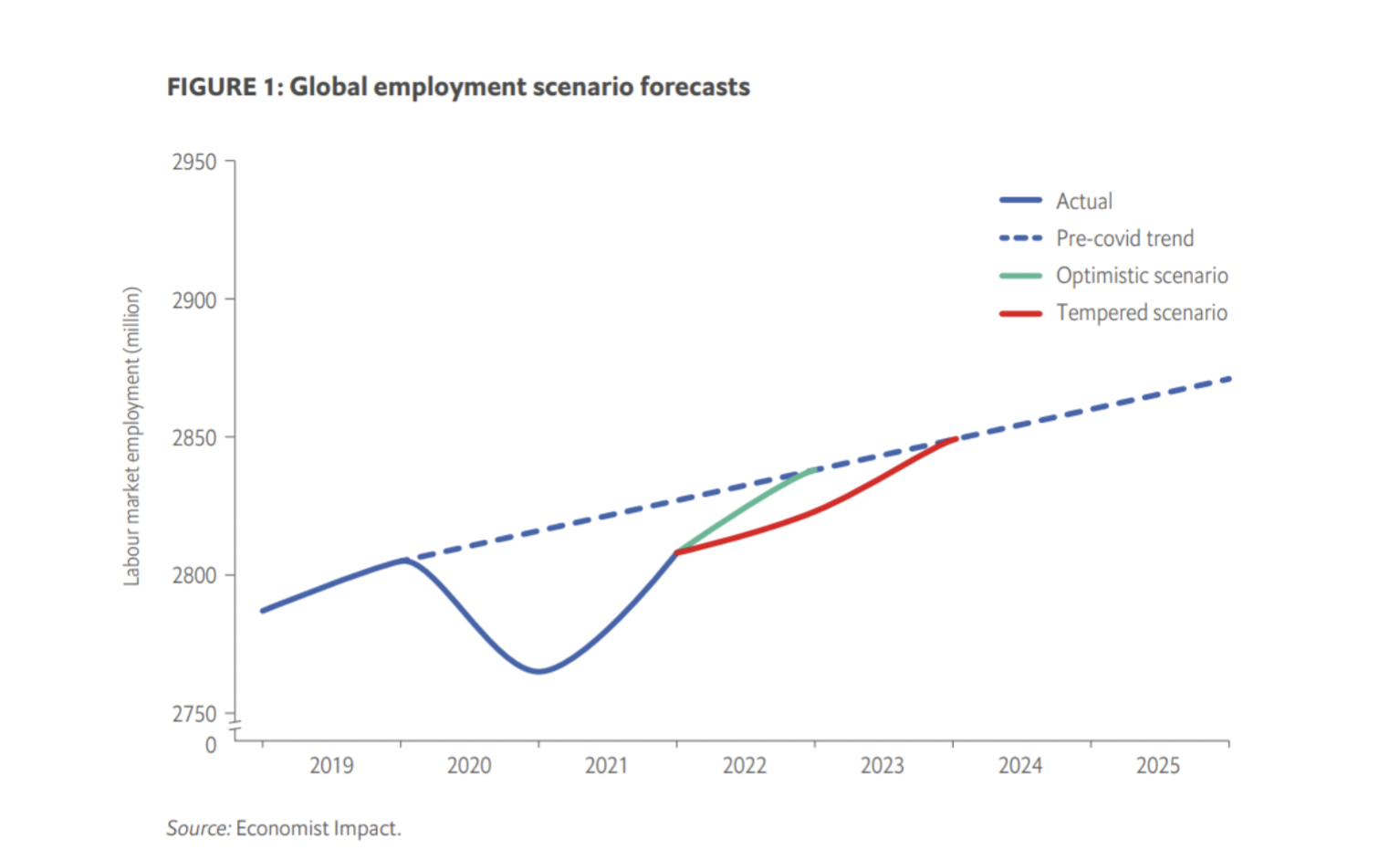Economist Impact, supported by The Adecco Group, developed employment forecasts that offer a new way of understanding the labour market outlook at a global and regional level. These forecasts can be used by organisations to help chart a proactive path forwards to tackle talent scarcity, highlighting the importance of scenario planning in times of uncertainty.
The number of people employed globally has already returned to 2019 pre-pandemic levels. It is valuable, however, to consider where employment would have been, had Covid-19 not happened. According to this study, global employment would have stood at 2.83bn in 2021 had the pandemic not occurred, showing an ongoing gap of 0.7% to the actual number of people employed.
The war in Ukraine, interest rates, inflation and food prices are just some of the factors impacting labour market forecasts. These factors lead us to forecast that global employment will fully recover to a pre-Covid trend in 2023.

The Adecco Group’s CFO and Chief Economist, Coram Williams, said: “When I speak with business leaders, the labour shortage is inevitably their uppermost concern. They know that big-picture demographic trends are not in their favour, and their first question is as fundamental as it is urgent: Will there be enough people, with the necessary skills, to get my organisation’s work done?”
John Ferguson, Head of Economist Impact's Globalisation, Trade and Finance practice, said: “At a global level our analysis expects the labour market to fully recover from the impact of Covid-19 by next year. When we dive deeper, our unique scenario analysis highlights the myriad factors that impact this recovery at a regional level.
Ongoing uncertainty is most acutely highlighted in our European analysis. Before the war in Ukraine, employment in Europe was expected to recover in 2022. Now, taking into account the impact of the war, that recovery may occur in 2023 in an optimistic scenario, with a downside scenario forecasting recovery in 2024 at the earliest.”
WHAT CAN ORGANISATIONS DO TO TACKLE TALENT SCARCITY?
-
Understand the workforce at a skills level and embrace the entire talent pool: At The Adecco Group, we have long advocated reskilling and upskilling workers. Going forward, organiastions must invest in understanding skills data in order to better position, develop and upskill all workers, including contingent workers and those returning from work absences. To manage a complex workforce in uncertain times, organisations should use scenario analysis as part of strategic workforce planning to stay cognizant of regional labour market differences. It is also prudent to carefully plan when and where reliable and consistent access to people and skills is needed and where flexibility can be used advantageously to tackle uncertainty.
-
Pay attention to new workforce expectations: In a separate study, the Adecco Group surveyed 14,000 workers to understand their priorities and the results demonstrate that maintaining a good work-life balance is just as important as salary. Career development and up-/ reskilling opportunities, feeling trusted to get the job done, having leaders who exercise empathy and lead with purpose are also key components for an engaged, productive and loyal workforce.
-
Focus on resilient, flexible business models: By maintaining focus on resilient, flexible business models that emerged during Covid, and adapting to cope with ongoing uncertainty, it’s possible to forge a strong and successful path forward.
Editor’s Note on Methodology
The report explores current employment trends and the forces shaping the trajectory of a recovery, with a focus on the established relationship between economic growth and employment levels. The analysis maps out optimistic and tempered scenarios for a labour market recovery to pinpoint when employment levels are expected to converge with pre-Covid trends and its impact on wage-price spirals.
Economist Impact adopted a combination of two approaches to employment forecasting. First, to estimate the potential paths of employment in each region, we relied on econometric equations based on Okun’s law that exploit the fundamental relationship between economic growth and employment. Applying these models to each economy in our analysis, we were able to create scenarios for employment based on tempered and optimistic assumptions about economic growth in each region. Second, to determine the counterfactual level of employment that would have occurred if the pandemic had not taken place, we used a combination of historical data and pre-Covid employment forecasts to create assumptions for employment growth in the absence of Covid-19. With this framework in place, it was possible to examine the different paths for employment growth in each region and assess the time it might take to close the true employment gaps that remain post-Covid.
Quick Links:
-
Read full press release, here.
-
The Adecco Group at the World Economic Forum, here.
-
Watch the Impact of Talent Scarcity on the Future of Work webinar here.
-
Read additional commentary from our CFO and Chief Economist, Coram Williams, here.
-
Read additional insights on Talent Scarcity from our Chief Executive Officer, Alain Dehaze, here.
-
Sign up to receive our Insights Magazine for more coverage of the Future of Work. Download our latest issue here.
For further information please contact: Mara.Stefan@adeccogroup.com
The Adecco Group Press Office
media@adeccogroup.com or +41 (0) 44 878 87 87
adeccogroup.com
Facebook: facebook.com/theadeccogroup
Twitter: @AdeccoGroup
About the Adecco Group
The Adecco Group is the world’s leading talent advisory and solutions company. We believe in making the future work for everyone, and every day enable more than 3.5 million careers. We skill, develop and hire talent in 60 countries, enabling organisations to embrace the future of work. As a Fortune Global 500 company, we lead by example, creating shared value that fuels economies, and builds better societies. Our culture of inclusivity, fairness and teamwork empowers our employees.
The Adecco Group is headquartered in Zurich, Switzerland (ISIN: CH0012138605) and listed on the SIX Swiss Exchange (ADEN).
